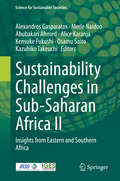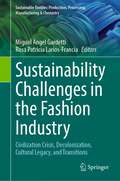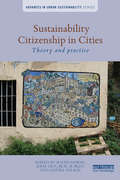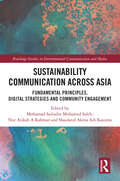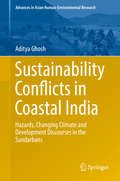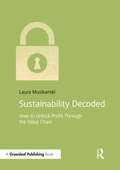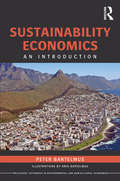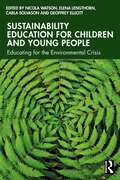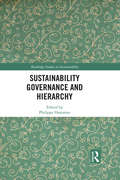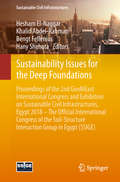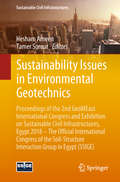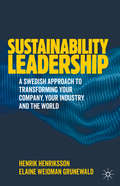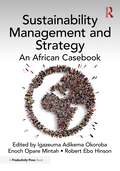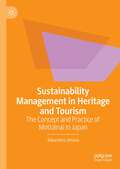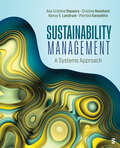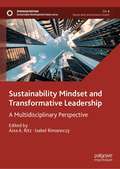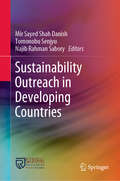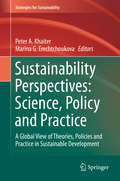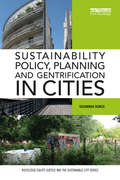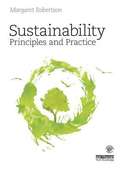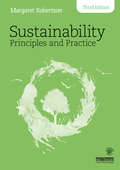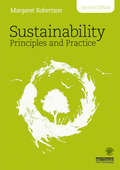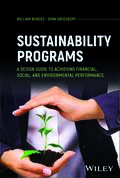- Table View
- List View
Sustainability Challenges in Sub-Saharan Africa II: Insights from Eastern and Southern Africa (Science for Sustainable Societies)
by Alexandros Gasparatos Kensuke Fukushi Osamu Saito Kazuhiko Takeuchi Abubakari Ahmed Merle Naidoo Alice KaranjaThe aim of this two-volume book series is to highlight some of the most pervasive sustainability challenges that Sub-Saharan Africa faces. The two volumes contain 20 chapters that illustrate very diverse sustainability challenges throughout the continent, adopting interdisciplinary and problem-oriented research approaches, and methods from the natural and the social sciences. The very diverse case study chapters are put into perspective with chapters that introduce key sustainability challenges using a regional focus. Through this multi-scale and interdisciplinary approach the two volumes provide an authoritative source about the major sustainability challenges in the continent, and how to mobilise such perspectives to develop appropriate solutions. The two volumes have a uniquely broad focus that fills a major gap in the emerging Sustainability Science scholarship. Parts I-II highlight specific case studies on major sustainability challenges from Eastern and Southern Africa. Part III synthesizes the main lessons learnt from the chapters in the two edited volumes.
Sustainability Challenges in the Fashion Industry: Civilization Crisis, Decolonization, Cultural Legacy, and Transitions (Sustainable Textiles: Production, Processing, Manufacturing & Chemistry)
by Miguel Ángel Gardetti Rosa Patricia Larios-FranciaFashion, and the growth of fashion, are presented as the manifestation of a process of civilization, within a capitalist culture (capital understood as material possessions) that has become global and imperialist, of which - in an economic sense - the industry (or the fashion system?) functions as one of its main instruments of exploitation. And with respect to design, Arturo Escobar said: "Can design detach itself from its roots in modernist practices of unsustainability and defuturization and reorient itself towards other commitments, practices, narratives and ontological enactions? Moreover, can design be part of the toolkit for the transition to the pluriverze (i.e. a world in which many worlds can fit)?" This book presents the importance of cultural sustainability in the textiles and fashion industry, decolonizing fashion system and promotes the design for transitions.
Sustainability Citizenship in Cities: Theory and practice (Advances in Urban Sustainability)
by Ralph Horne Anitra Nelson John Fien Beau B. BezaUrban sustainability citizenship situates citizens as social change agents with an ethical and self-interested stake in living sustainably with the rest of Earth. Such citizens not only engage in sustainable household practices but respect the importance of awareness raising, discussion and debates on sustainability policies for the common good and maintenance of Earth’s ecosystems. Sustainability Citizenship in Cities seeks to explain how sustainability citizenship can manifest in urban built environments as both responsibilities and rights. Contributors elaborate on the concept of urban sustainability citizenship as a participatory work-in-progress with the aim of setting its practice firmly on the agenda. This collection will prompt practitioners and researchers to rethink contemporary mobilisations of urban citizens challenged by various environmental crises, such as climate change, in various socio-economic settings. This book is a valuable resource for students, academics and professionals working in various disciplines and across a range of interdisciplinary fields, such as: urban environment and planning, citizenship as practice, environmental sociology, contemporary politics and governance, environmental philosophy, media and communications, and human geography.
Sustainability Communication across Asia: Fundamental Principles, Digital Strategies and Community Engagement (Routledge Studies in Environmental Communication and Media)
by Mohamad Saifudin Mohamad Saleh, Nur Atikah A Rahman and Shaidatul Akma Adi KasumaSustainability Communication across Asia distils the core components of environmental communication in the diverse milieu of Asian nations such as Indonesia, Malaysia, the Philippines, Thailand, and China. The chapters in this book engage readers in a clear-sighted view of issues, challenges, and strategies related to sustainability communication in Asia, examining fundamental principles, digital strategies, and the role of language, as well as community engagement. The first part of the book features underpinning ideologies of sustainability communication. The authors go on to explore the prevalent trends and approaches in sustainable communication in the digital realm, examining the internet in general, social media, and gaming platforms. Finally, the book discusses the green efforts adopted among selected Asian communities, the role of communication, and the resulting societal impacts. Readers will be introduced to many related examples of Asian sustainability cases and issues that may differ from Western experiences. Interesting topics such as environmental gamification, edutainment and sustainability communication, and social media and sustainability are among those presented and elaborated at length by 21 writers with industrial and academic backgrounds. Practical and inspiring, this book will be of great interest to students and scholars of sustainability and environmental communication, and Asian studies in general.
Sustainability Conflicts in Coastal India
by Aditya GhoshThis multidisciplinary work analyses challenges to sustainable development amidst rapidly changing climate in the world's largest delta - the Sundarbans. Empirical evidence unpacks grounded vulnerabilities and reveals their temporal socio-economic impacts. A novel concept of 'everyday disasters' is proposed - supported by data and photographic evidence - that contests institutional disaster definition. Then it uncovers how the geopolitics of ecological governance and its hegemonic discourse dominate local policies, which in turn fail to address local socio-ecological concerns, adaptation needs and development aspirations. Absence of local vocabularies, cognitive values and socio-cultural contexts along with spatially constricted, exclusionary, top-down techno-science approaches further escalate knowledge-action gaps. Deconstruction of multiscalar conflicts between the global rhetoric and transformative postcolonial geographies offers an ethical, Southern perspective of sustainability.
Sustainability Decoded: How to Unlock Profit Through the Value Chain (DoShorts)
by Laura MusikanskiThe value chain is the tried and true foundation of any profitable business.Sustainability Decoded is a no-nonsense business book that shows you how to increase profits by integrating sustainability into your company's value chain. This practical guide provides innovative tools and approaches for adding value at each station, including: Sustainability Matrix Decision Tool for Codes of Conduct; Triple Bottom Line Short Form; Eco-Label Graphic Matrix; Sustainability Ratio Guide; Life Cycle Analysis Grid; Local-Global Scorecard; the Redesign Card; the Green IT Checklist; the Balanced Scorecard for Life; the Biomimcry Backwards Forwards Tool.Sustainability Decoded provides a profitable means to practice sustainability. It is as useful to the non-business person who needs a quick guide to the practicalities and principles of adding value right across business processes as it is to the seasoned business professional looking for practical and profitable inspiration from sustainability. Includes case studies on Patagonia, and One PacificCoast Bank.
Sustainability Economics: An Introduction
by Peter BartelmusThe book is a concise introduction to an emerging field within economics. Drawing on numerous disciplines, including environmental science, environmental and ecological economics and optimal growth theory, sustainability remains a hazy and complex subject. The author set out with two objectives: one, to bring some order into the proliferating measures, models and management of sustainability; and two, to facilitate access to a complex inter-disciplinary subject area. The book points to practical ways of assessing and enhancing the long-term environmental and economic sustainability of our economies. The result is a fully international study that should bridge the gap between disciplines and prove to be an essential guide to anyone interested in one of the most important concepts in the social sciences.
Sustainability Education for Children and Young People: Educating for the Environmental Crisis
by Carla Solvason Geoffrey Elliott Nicola Watson Elena LengthornThis seminal volume responds to the pressing need to prepare all children and young people for a sustainable future in light of the climate crisis, providing clear and accessible information and strategies on how to fully embed sustainability into pedagogy and supporting current and future educators.This book explores key environmental issues before exploring a range of pedagogies, each grounded in hope and exemplifying the principles of inclusion, empowerment, agency and social justice. Chapters explore major themes such as climate migration and displacement, climate activism, nature connectedness, sustainable leadership and eco‑anxiety to offer practical, scalable pedagogies that connect with the natural world. Designed to channel climate anxieties into energy for a reinvigorated, sustainable future of education, this book encourages an accessible and considered approach to classroom practice. Featuring contributions from wealth of international experts in the field, the volume ultimately provides a valuable resource for educators and students of education in all phases to develop the confidence to take an active lead in shaping education to help ensure a sustainable future.This book will appeal to educators, policymakers and researchers in environmental and sustainability education, teacher education, social justice education and educational leadership. Curriculum designers as well as those working across primary, secondary and higher education will also find the volume of interest.
Sustainability Governance and Hierarchy (Routledge Studies in Sustainability)
by Philippe HammanSustainability Governance and Hierarchy provides a solid, theoretically and empirically grounded reflection on the concept of "sustainability governance". This idea has been growing in popularity in social science literature, as well as among decision-makers and governance actors, as it brings together two vast fields of study that have sometimes been dismissed as vague or ideologically loaded. In order to link the concepts of "sustainability" and "governance", the book is organized around the exploration of hierarchy issues, which often lie in the background of the existing literature but are not the focus of analysis. The chapters reflect ongoing controversies and dialogue between scientists with different theoretical and thematic backgrounds, who are all willing to participate in and contribute to a constructive effort to reach a more inclusive and more theoretically relevant stage for sustainability studies, being content with merely global analyses. The book is an innovative contribution to the hierarchy/non-hierarchy debate regarding governance arrangements in the field of sustainability and sustainability studies. This book will be of interest to advanced students and scholars focusing on governance issues, sustainability studies, environmental studies, as well as on the methodological aspects of the social sciences (economy, geography, law, philosophy, political science, sociology, urbanism and planning).
Sustainability Issues for the Deep Foundations: Proceedings of the 2nd GeoMEast International Congress and Exhibition on Sustainable Civil Infrastructures, Egypt 2018 – The Official International Congress of the Soil-Structure Interaction Group in Egypt (SSIGE) (Sustainable Civil Infrastructures)
by Hany Shehata Hesham El-Naggar Khalid Abdel-Rahman Bengt FelleniusThis volume presents some advances in the analysis and design of deep foundations. It contains 21 technical papers covering various aspects of analysis and design of deep foundations based on full-scale field testing, numerical modeling and analytical solutions. They present results and findings from research as well as practical-oriented studies on deep foundations that are of interest to civil/geotechnical engineering community. The topics cover a wide spectrum of applications that include evaluation of the axial and lateral capacity of piles, pile group effects, evaluation of the increase in pile capacity with time (or pile setup), influence of excavation on pile capacity, study the behavior of pile raft caisson foundations, evaluation of the bearing capacity and settlement of piles from cone penetration tests, etc. The volume is based on the best contributions to the 2nd GeoMEast International Congress and Exhibition on Sustainable Civil Infrastructures, Egypt 2018 – The official international congress of the Soil-Structure Interaction Group in Egypt (SSIGE).
Sustainability Issues in Environmental Geotechnics: Proceedings of the 2nd GeoMEast International Congress and Exhibition on Sustainable Civil Infrastructures, Egypt 2018 – The Official International Congress of the Soil-Structure Interaction Group in Egypt (SSIGE) (Sustainable Civil Infrastructures)
by Hesham Ameen Tamer SorourThis edited volume deals with the attempts made by the scientists and practitioners to address contemporary issues in geoenvironmental engineering such as characterization of dredged sediments, geomaterials and waste, valorization of waste, sustainability in waste management and some other geoenvironmental issues that are becoming quite relevant in today's world especially in view of the high urbanization rates, advancement in technologies, and changes in consumption behavior of people. In this regard, wastes generated through the daily activities of individuals and organizations pose many challenges in their management. The volume is based on the best contributions to the 2nd GeoMEast International Congress and Exhibition on Sustainable Civil Infrastructures, Egypt 2018 – The official international congress of the Soil-Structure Interaction Group in Egypt (SSIGE).
Sustainability Leadership: A Swedish Approach to Transforming your Company, your Industry and the World
by Henrik Henriksson Elaine Weidman GrunewaldAs CEOs and business leaders navigate a world of complex global challenges, sustainability is no longer optional but a business imperative. In this book, two sustainability leaders with decades of experience – Henrik Henriksson, CEO of Scania and Elaine Weidman Grunewald, Co-founder of the AI Sustainability Center, and former Chief Sustainability & Public Affairs Officer at Ericsson – offer a simple but powerful three-step model for leading an organization on a sustainability transformation journey that aims at big, audacious, world-changing goals.Honest about the dilemmas but bullish on the opportunities, the authors advise leaders on how to accelerate sustainability in their organizations told through a Swedish lens, where the country’s values and culture permeate the boardroom and the C-suite, bringing a unique clarity and conviction to leading with integrity.In practical insights gleaned from the authors’ own experience, the book takes leaders through the three phases of sustainability leadership: from establishing a solid foundation rooted in purpose, culture, values, principles and consistent, credible leadership, to integrating sustainability into the core business, and then to executing a vision that not only shifts the direction of the company but can change an entire industry, and even the world.Throughout the book, more than 25 interviews with other leading CEOs of Swedish companies as well as successful start-ups, investors, economists, and other experts illuminate the path to sustainability leadership from different perspectives. These are complemented by case studies describing how companies got it right – or turned themselves around after getting it very, very wrong. With this hands-on insiders’ guide, CEOs and C-suite leaders can take sustainability to the next level. This is the encouragement and inspiration business leaders need to move past incremental improvement at a time when exponential, world-changing action is more urgent than ever.
Sustainability Management and Strategy: An African Casebook
by Robert Ebo Hinson Enoch Opare Mintah Igazeuma Adikema OkorobaWith Africa predicted to emerge as a leading market in the coming years, the debate on sustainability, especially on the mitigation of business impact on the continent’s environment and society, cannot be underestimated. Prior to the worsening impact of climate change, the continent has historically been struggling to consolidate sustainability efforts in driving social and environmental protection caused by both foreign (majorly) and local business activities in the region. To capture current social and environmental injustice plaguing the African continent, Secretary‑General Prof. Petteri Taalas of the World Meteorological Organization (WMO) opined that "Africa is responsible for less than 10 percent of global greenhouse gas emissions, but it is the continent which is the least able to cope with the negative impacts of climate change. Heatwaves, heavy rains, floods, tropical cyclones, and prolonged droughts are having devastating impacts on communities and economies, with increasing numbers of people at risk."Sustainability Reporting Frameworks have empowered sustainability leaders, most especially Chief Sustainability Officers (CSOs), in organizations to develop practical strategies for leading sustainability‑related issues while driving systemic change for collective thinking towards mitigating the impact of climate change on society and the environment. While there is undoubtedly a plethora of standards, codes, and toolkits to help frame the sustainability drive, with leading CSOs around the globe sharing their lived experiences, the narrative for best practices, and what the content of sustainability initiatives and reporting should be have been skewed to the Western or advanced economies’ narrative. This reporting has drowned out other continent‑specific narratives that offer a diverse pool of perspectives and locally rich content on some sustainability actions and achievements, especially from CSOs. The role of business sustainability leaders and CSOs in Africa in positioning the continent as the "market of tomorrow" with sound and robust sustainability practices needs to be spotlighted. Owing to the gap, this book brings the urgency to light through case studies and stories from leading African businesses, while capturing their sustainability strategies and achievements. This book moves beyond the experience and context of business in advanced economies and responds to the need for an alternative narrative of sustainability leadership in Africa. The focus of this book is on the role of sustainability leadership over the last decade and discusses the contributions and challenges of navigating this multi‑disciplinary function in different sectors. The authors share their insight into this under‑researched and under‑reported perspective highly relevant to business and sustainability, and environmental, social, and governance (ESG) reporting in a growing region like Africa.
Sustainability Management in Heritage and Tourism: The Concept and Practice of Mottainai in Japan
by Takamitsu JimuraIncreasingly, the tourism industry is looking towards sustainability, responding to public demand and local environmental policy. This monograph explores the concept of sustainability in the context of heritage and tourism studies, as well as examining the practices adopted to realize or enhance the sustainability of these industries. Beginning with a broad overview, outlining the theory and scholarly landscape, this book then focuses on cases of sustainable tourism in Japan, exploring the concept of ‘mottainai’. Mottainai is a traditional Japanese term and means an ethical attitude towards the use of a range of resources needed for human life. This Japanese word can be understood as ‘what a waste’, and can promote the environmentally-friendly way of life, encouraging reduce, reuse and recycle.This book will be of interest to scholars and students of heritage, tourism, and sustainability management; both those interested in Japan specifically, and those who are interested in new approaches for sustainability in tourism management.
Sustainability Management: A Systems Approach
by Ana Cristina Siqueira Cristina Neesham Nancy E. Landrum Patricia KanashiroConsumer demand for sustainable business practices has never been greater. Sustainability Management uses a systems thinking approach to illustrate the interdependencies among ecosystems, societies, organizations, and individuals. Authors Ana Cristina Siqueira, Cristina Neesham, Nancy E. Landrum, and Patricia Kanashiro explain why sustainability presents risks and opportunities for businesses, how sustainability can be a source of competitive advantage, and the business impact on the environment and society. This timely new text examines some of today’s most pressing issues including social justice, racial equity, human rights, and climate crisis. Case Studies tied to UN Sustainable Development Goals spotlight innovative sustainable strategies from companies around the world.
Sustainability Management: A Systems Approach
by Ana Cristina Siqueira Cristina Neesham Nancy E. Landrum Patricia KanashiroConsumer demand for sustainable business practices has never been greater. Sustainability Management uses a systems thinking approach to illustrate the interdependencies among ecosystems, societies, organizations, and individuals. Authors Ana Cristina Siqueira, Cristina Neesham, Nancy E. Landrum, and Patricia Kanashiro explain why sustainability presents risks and opportunities for businesses, how sustainability can be a source of competitive advantage, and the business impact on the environment and society. This timely new text examines some of today’s most pressing issues including social justice, racial equity, human rights, and climate crisis. Case Studies tied to UN Sustainable Development Goals spotlight innovative sustainable strategies from companies around the world.
Sustainability Mindset and Transformative Leadership: A Multidisciplinary Perspective (Sustainable Development Goals Series)
by Isabel Rimanoczy Aixa A. RitzThis volume examines the importance of leadership in developing an effective sustainability strategy. It defines the sustainability mindset and surveys the primary motivations, conditions, or environment(s) that cause leaders to embrace sustainable practices. As described in the UN Sustainable Development Goal 8, embracing the sustainability mindset will lead to greater productivity and promote economic growth.Organized into themes of organizational operations, leadership competencies, and leadership practices, the chapters, written by contributors representing global perspectives, tackle topics such as strategy, culture, and leadership styles in developing a new form of mindfulness for leaders as well as organizations. Recognizing the need for accelerated change in organizations as well as society at large, this book presents scholars with a framework for establishing a mindset for sustainability to foster much-needed transformative leadership.
Sustainability Networks: Cognitive Tools for Expert Collaboration in Social-Ecological Systems (Routledge Studies in Ecological Economics #1)
by Janne HukkinenSustainability is a word that means different things depending on who is using it, thus underlining the potential problems involved in experts from different fields teaming up to tackle sustainability problems. In this book, Janne Hukkinen argues for a reflexive approach to sustainability as a means of coming to grips with the threatening challenges arising out of human-environment interaction. The author illustrates his argument with a case study of natural resource management in Lapland, showing how sustainability is understood holistically by academics and professionals alike. This book reflects an emerging cognitive turn in sustainability sciences, conceptualizing environmental challenges during action on our social and material environments, rather than in isolation. Hukkinen argues that this conceptual blending enables sustainability experts to hybridize themselves: to immerse themselves in the fields of other experts and imagine the other's work - both prerequisites of trans-disciplinary knowledge integration. This book shows how sustainability experts can reveal their intellectual engagements when designing scenarios and indicators and presents a rigorous framework for organizing expert collaboration.
Sustainability Outreach in Developing Countries
by Tomonobu Senjyu Mir Sayed Shah Danish Najib Rahman SaboryThis book presents a comprehensive collection of recent research on the timely topic of sustainable development goals, with a focus on developing countries. In this manner, it furnishes interdisciplinary coverage in terms of sustainable development; it sets forth the pillars of sustainability (environmental, technical and technological, social, institutional, and economic disciplines); and it explores the adaption of these pillars for long-term sustainability.With its survey of transboundary research, experiences, and lessons learned, the book offers integrated conceptual and empirical contributions from diverse interrelated fields. Viable options are set forth for societies in transition in the twenty-first century to achieve well-being in the lives of their people through the eradication of poverty, mitigation of climate change, promotion of lifelong learning opportunities, and empowerment of society. These options also make it possible to deploy affordable energy, sustain economic growth, offer innovation, reduce inequality, and finally, to help ensure global sustainability.
Sustainability Perspectives: A Global View of Theories, Policies and Practice in Sustainable Development (Strategies for Sustainability)
by Peter A. Khaiter Marina G. ErechtchoukovaThe book presents methodological and applied aspects of sustainability and sustainable management from different countries and regions around the globe. It discusses approaches to sustainability assessment, demonstrates how ideas of sustainability and sustainable management are incorporated into public policies and private actions at local and national levels. Authors focus on promoting greater sustainability in natural resource management, energy production and storage, housing design, industrial reorganization, coastal planning, land use, and business strategy, including sustainability indicators, environmental damages, and theoretical frameworks. Chapters reflect environmental, economic and social issues in sustainable development, challenges encountered, and lessons learned as well as solutions proposed.
Sustainability Policy, Planning and Gentrification in Cities (Routledge Equity, Justice and the Sustainable City series)
by Susannah BunceSustainability Policy, Planning and Gentrification in Cities explores the growing convergences between urban sustainability policy, planning practices and gentrification in cities. Via a study of governmental policy and planning initiatives and informal, community-based forms of sustainability planning, the book examines the assemblages of actors and interests that are involved in the production of sustainability policy and planning and their connection with neighbourhood-level and wider processes of environmental gentrification. Drawing from international urban examples, policy and planning strategies that guide both the implementation of urban intensification and the planning of new sustainable communities are considered. Such strategies include the production of urban green spaces and other environmental amenities through public and private sector and civil society involvement. The resulting production of exclusionary spaces and displacement in cities is problematic and underlines the paradoxical associations between sustainability and gentrified urban development. Contemporary examples of sustainability policy and planning initiatives are identified as ways by which environmental practices increasingly factor into both official and informal rationales and enactments of social exclusion, eviction and displacement. The book further considers the capacity for progressive sustainability policy and planning practices, via community-based efforts, to dismantle exclusion and displacement and encourage social and environmental equity and justice in urban sustainability approaches. This is a timely book for researchers and students in urban studies, environmental studies and geography with a particular interest in the growing presence of environmental gentrification in cities.
Sustainability Principles and Practice
by Margaret RobertsonSustainability Principles and Practice gives an accessible and comprehensive overview of the interdisciplinary field of sustainability. The focus is on furnishing solutions and equipping the student with both conceptual understanding and technical skills for the workplace. Each chapter explores one aspect of the field, first introducing relevant theory and presenting issues, then supplying tools for working toward solutions. Elements of sustainability are examined piece by piece, and wide coverage ranges over ecosystems, social equity, environmental justice, food, energy, product life cycles, cities, and more. Techniques for management and measurement as well as case studies from around the world are provided. Chapters include further reading, discussion questions, and problems to foster quantitative thinking. The book is supported by a companion website with key website links, detailed reading lists, glossary, and additional case studies, together with numerous projects, research problems, and group activities, all of which focus on real-world problem solving of sustainability issues. The textbook is designed to be used by undergraduate college and university students in sustainability degree programs and other programs in which sustainability is taught.
Sustainability Principles and Practice
by Margaret RobertsonSustainability Principles and Practice gives an accessible and comprehensive overview of the interdisciplinary field of sustainability. The focus is on furnishing solutions and equipping students with both conceptual understanding and technical skills. Each chapter explores one aspect of the field, first introducing concepts and presenting issues, then supplying tools for working toward solutions. Elements of sustainability are examined piece by piece, and coverage ranges over ecosystems, social equity, environmental justice, food, energy, product life cycles, cities, and more. Techniques for management and measurement as well as case studies from around the world are provided. The 3rd edition includes greater coverage of resilience and systems thinking, an update on the Anthropocene as a formal geological epoch, the latest research from the IPCC, and a greater focus on diversity and social equity, together with new details such as sustainable consumption, textiles recycling, microplastics, and net-zero concepts. The coverage in this edition has been expanded to include issues, solutions, and new case studies from around the world, including Europe, Asia, and the Global South. Chapters include further reading and discussion questions. The book is supported by a companion website with online links, annotated bibliography, glossary, white papers, and additional case studies, together with projects, research problems, and group activities, all of which focus on real-world problem-solving of sustainability issues. This textbook is designed to be used by undergraduate college and university students in sustainability degree programs and other programs in which sustainability is taught.
Sustainability Principles and Practice: Principles And Practice
by Margaret RobertsonSustainability Principles and Practicegives an accessible and comprehensive overview of the interdisciplinary field of sustainability. The focus is on furnishing solutions and equipping the student with both conceptual understanding and technical skills for the workplace. Each chapter explores one aspect of the field, first introducing relevant theory and presenting issues, then supplying tools for working toward solutions. Elements of sustainability are examined piece by piece, and wide coverage ranges over ecosystems, social equity, environmental justice, food, energy, product life cycles, cities, and more. Techniques for management and measurement as well as case studies from around the world are provided. Chapters include further reading, discussion questions, and problems to foster quantitative thinking. The book is supported by a companion website with key website links, detailed reading lists, glossary, and additional case studies, together with numerous projects, research problems, and group activities, all of which focus on real-world problem solving of sustainability issues. The textbook is designed to be used by undergraduate college and university students in sustainability degree programs and other programs in which sustainability is taught.
Sustainability Programs: A Design Guide to Achieving Financial, Social, and Environmental Performance
by William Borges John GrosskopfGo-to guidance for designing, implementing, and managing effective sustainability programs and their management systems Moving past vague concepts, buzzword overloads, superficial efforts, and flavor-of-the-month misdirections, Sustainability Programs presents a pragmatic, step-by-step approach to creating and managing adaptable, organization-wide sustainability programs to achieve People, Planet, and Profit (3P) objectives with least cost, effort, and risk. Key steps covered in this book include reaching a programmatic “Go” decision, developing sustainability policies, designing an organizational framework, defining the most pressing sustainability needs, and cascading 3P goals, tactics, targets, and initiatives into business units, functions, and departments to create new capabilities and improve performance. By following the principles and practices in this book, any organization can better achieve sustainability’s full promise of social responsibility, environmental stewardship, and financial performance. Written by authors with a wealth of practitioner experience in the field, Sustainability Programs explores topics including: Creating social, environmental, and financial strategies, tactics, targets, and initiatives that create new capabilities and resolve 3P performance issuesAvoiding ad hoc projects that fail to address critical sustainability issues, wasting valuable resources and squandering competitive advantagesOvercoming technical professionals’ lack of business management experience and helping management professionals understand sustainability’s benefits and intricaciesUnderstanding sustainability through the management lenses of risk reduction, improved efficiencies through eradication of wastes, increased revenues via innovation, and enhanced competitive advantages fueled by greenwash-free transparency.Responding to the demanding data capture, analysis, and reporting challenges of environmental, social, and governance (ESG). Acknowledging that one size does not fit all, this book delivers individual concepts and methods adaptable across any organization’s value chains. It is an essential read for leaders and practitioners working within private and public enterprises of all types and sizes, especially those with 2,000 to 5,000 employees.
